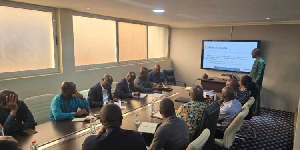Ishmael Mensah Blog of Thursday, 9 January 2025
Source: Ishmael Mensah
Dumsor: WAPCo postpones pipeline repairs to avoid a power outage.

To prevent an impending power outage in Ghana, the West African Gas Pipeline Company (WAPCo) has consented to defer its scheduled pipeline maintenance by two weeks. Chief of Staff Julius Debrah formed a technical team to address the impending energy crisis, and the committee conducted lengthy negotiations that resulted in this decision.
The Ghana Grid Company (GRIDCo) identified the repair as a serious threat to the nation's electrical supply, and it was originally planned to start this week.
GRIDCo cautioned that Ghana's power generation capacity would be seriously crippled by the prolonged fuel shortages for thermal plants and the interruption in the pipeline's gas delivery.
The technical committee, GRIDCo officials, and WAPCo representatives discussed the possible effects of the maintenance on the national grid at a high-level meeting.
The potential return of power outages, which might cause disruptions to homes and businesses nationwide, sparked worries. In order to give authorities more time to find other fuel sources and stabilize electricity generation, WAPCo decided to postpone the maintenance after the talks.
An Overview of the Fuel and Maintenance Crisis
Natural gas is transported from Nigeria to Ghana, Togo, and Benin via WAPCo's pipeline. The pipeline's efficiency and safety depend on the planned maintenance. But because Ghana's thermal facilities are gas-powered, any interruption may have a serious impact on the country's electricity supply.
The nation is also currently experiencing a shortage of fuel, which has put additional strain on the electricity industry. To lessen the effects of the gas supply shortage, efforts are being made to import more liquefied natural gas (LNG) and light crude oil.
In order to keep the electricity supply going during the eventual repair time, the government and pertinent parties are striving to expedite fuel imports and complete backup preparations.


















